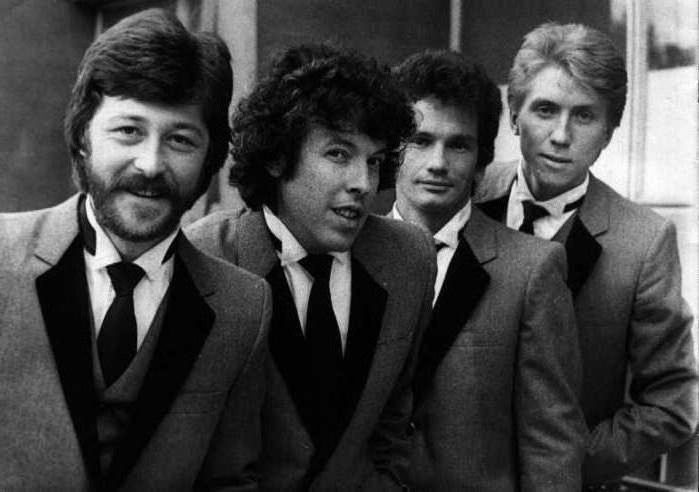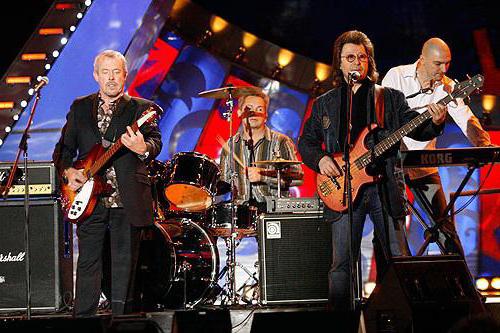It often happens that the name of an artist or musical group becomes for millions of people a symbol of the era they have lived through - it is so closely intertwined with their personal memories that it becomes an integral part of them. For many of today's Russians, and especially for those whose youth fell on the seventies and eighties, this is, of course, the Time Machine group. The composition, photo and description of the creative path of the legendary team will be the topic of our article.
How it all began
It all started back in 1968, when a rock band called The Kids was created by the students of Moscow school No. 19. Today's old men remember well that in those days it was rarely possible to find a school that did not have its own vocal and instrumental ensemble. This fashion was a tribute to the general enthusiasm for the songs of the then western idols Beatles, Rolling Stones and other inhabitants of the musical Olympus.
From English, the name of the group could be translated in different ways - "kids", "guys" and even "kids." So, the first line-up of these "kids-kids" included: Andrei Makarevich, his friend Mikhail Yashin and two vocalist girls - Larisa Kashpero and Nina Baranova. Imitating their idols, the group performed without much success with the English-language repertoire at various school evenings and amateur concerts. Looking ahead, it should be said that the composition of the “Time Machine” group will change many times over the years.
English version of the group name
Fate gave them a chance when the professional Atlanta VIA performed at their school the same year, and its leader A. Sikorsky communicated with young musicians on equal terms and even paused for music during the break. This evening helped the guys believe in themselves. The very next year, they will create a new team, which includes their peers from the neighboring school number 20 - the same Beatles fans, like themselves. The beginning of the journey was laid.
The name of the group was taken, as in the first case, the English - Time Machines, the prototype of the future "Time Machine", but in the plural. The first composition of the “Time Machine” was purely masculine. It included: Andrei Makarevich (guitar, vocals) - he will be a constant participant in all subsequent ensembles, Igor Mazaev (bass guitar), Alexander Ivanov (rhythm guitar), Sergey Kavagoe (keyboards), Pavel Rubin (bass guitar) and drummer Yuri Borzov. The future composition of the “Time Machine” will be mainly formed from them.
Failed architects
In the same 1969, the first recording of Time Machines songs took place, performing mainly with a repertoire composed of cover versions of hits by American and English groups, supplemented by English-language compositions of their own composition. Only after some time A. Makarevich began to write lyrics in Russian. There is no doubt that during this period the musicians were influenced by the hippie movement, popular among Western and Soviet youth. This was reflected in their songs, and in the whole lifestyle.
The seventies begin for two members of the group Andrei Makarevich and Yuri Borzov with an important event - they enter the Moscow Institute of Architecture, where, while comprehending the secrets of architecture, they continue to study music. They also meet with Alexei Romanov, who was soon to join the Time Machine, and a little later, with A. Kutikov, who in 1971 was invited to the group to replace I. Mazayev, who had left for the army.
The official appearance of the group name
At the beginning of the seventies, the collective continued to be amateur, and its composition changed repeatedly. During these years, Time Machines successfully performed in the beat club, then created in Moscow under the patronage of the Komsomol City Committee. It is curious that a year earlier they were not accepted there because of the "low level of performance." By the way, at the beginning of a career, the Beatles group for the same reason was refused to record songs.

The Russian-language and familiar to all the name of the group first officially appeared in 1973 and forever assigned to the team. Until 1975, he went through a difficult period, performing at dance floors and occasional concerts. During this period, the composition of the “Time Machine” has repeatedly changed. Fifteen musicians managed to visit this team. Problems arose in the life of the group leader A. Makarevich. Due to a conflict with the leadership of the architectural institute, he was expelled on a formal pretext.
Recognition of Professionalism
The group’s popularity grew rapidly when, after meeting with Boris Grebenshchikov at the Tallinn Festival in 1976, she often had the opportunity to tour in Leningrad. In the city on the Neva, she enjoyed continued success. The beginning of experiments with sound belongs to the same period. The composition of “Time Machine” in 1977 was replenished by saxophonist E. Legusov and trumpeter S. Velitsky. This gave the songs in their performance a new expressiveness.
In 1980, finally becoming a professional team, the group receives official status at the Rosconcert. O. Melik-Pashaev is appointed as its artistic director, and A. Makarevich as music director. This year, Time Machine awaited great success at the festival in Tbilisi, where it won the main prize, and thanks to which the first album released by the Melody company appeared.
Creativity to live outside the ideological framework
Those whose youth passed under socialism remember how the Soviet ideology, lying and hypocritical in its essence, filled all spheres of life, and mass art languished under its especially tight control. In order for the audience to see the new program, it had to get approval in various instances and art councils, where its fate was decided by people who did not understand anything in art and took into account only compliance with the requirements of the current line of the party.
The success of “Time Machine” at the Tbilisi Festival is due not only to the artistic merit of performing compositions. This was, in fact, the first case when musicians appeared on the official Soviet stage, who stood out sharply from the general faceless, but ideologically seasoned mass. No wonder the organizers of the concert discouraged by their phenomenal success took steps to ensure that the winning musicians left the festival before its end.
Triumph in the city on the Neva
In the eighties, the group’s popularity in Moscow and Leningrad took on unprecedented proportions. According to eyewitnesses, the excitement at their tour concerts was comparable only with the madness of the Beatlemania. The sports palace, where the performances were held, was attacked by thousands of teenagers, and the bus drivers delivering the musicians were forced to resort to detour maneuvers in order to save the composition of the Time Machine from the enthusiastic crowd. 1980 was the beginning of their all-time take-off.
The result of the twenty-year journey
In the early nineties, it is time to take the first results. Ideological censorship no longer exists, and Andrei Makarevich publishes his book “Everything is Very Simple,” in which he talks about everything that the group had to go through over the past twenty years. "Time Machine" is still among the most popular musical groups in the country. She takes part in many festivals and often travels with tours. Due to the fact that perestroika opened the possibility of unobstructed travel abroad, the geography of their trips has expanded significantly, including many countries of the world.

The composition of the “Time Machine”, by this time basically already established and time-tested, is periodically replenished by invited musicians, among them Pavel Rubin, Alik Sikorsky, Igor Mazaev and a number of other names well known to rock lovers. Without the participation of Andrei Makarevich and his team in the nineties, not a single New Year's program and not a single any noticeable festival are complete.
Group life in the difficult nineties
The group celebrated its twenty-fifth anniversary in 1994 with a grand concert on Red Square, in which many of the country's most popular music groups took to the stage. Their official position was strengthened in many respects due to the support they provided to Boris Yeltsin, participating in the 1996 campaign “Vote or lose,” which became part of his election campaign.
At the beginning of the 2000s, the composition of the Time Machine group was replenished with keyboard player Andrei Derzhavin. In their history, the next stage begins, which includes a lot of work related to the search for new forms of sound and the use of various audio effects. At the same time, the collective does not stop concert activity and the release of disks, both at Russian studios and abroad. In particular, their albums are released by the famous English company Sintez Records, famous for the production of Beatles records.
Events of the last decade
Makarevich begins the second decade of the 21st century with the release of three of his new books, which quickly became popular among music lovers of all ages. In 2012, a movie dedicated to them, shot by M. Kapitanovsky, appeared at the box office. It was called The Taimashin: The Birth of an Era, a literal repetition of how the Time Machine was blacklisted on the blacklist of ideologically unreliable musical groups in 1983.
The composition of the group throughout the history of its existence has changed many times. 2012 was no exception. At the end of June, E. Margulis left her, who preferred the development of her own project. Soon his place was taken by Igor Khomich, who had previously collaborated with the Kalinov Bridge group. In 2014, an anniversary charity concert was held with great success on the venue in front of the Luzhniki sports complex, in which the Time Machine group also performed. The composition of 2014 did not change, and at its 45th anniversary the team performed the most popular hits.
The worries of our day
In early February 2015, admirers of the group were alarmed by the information appeared in the press about the alleged split within the collective, related to the different positions of its members regarding the events in Ukraine. This information seemed quite likely, as recently political issues have become an exciting topic of discussion for many people. Fortunately, a rebuttal soon followed.
Finally, we will name the composition of the “Time Machine” group of 2015, which has remained unchanged to this day: Andrei Makarevich (guitar, vocals), Alexander Kutikov (vocals, bass), Valery Efimov (drums) and Andrei Derzhavin (keyboards, backing vocals) )